SEO
Top 7 SEO Keyword Research Tools For Agencies

All successful SEO campaigns rely on accurate, comprehensive data. And that process starts with the right keyword research tools.
Sure, you can get away with collecting keyword data manually on your own. But while you may be saving the cost of a premium tool, manual keyword research costs you in ot
her ways:
- Efficiency. Doing keyword research manually is time intensive. How much is an hour of your time worth?
- Comprehensiveness. Historical and comprehensive data isn’t easy to get on your own. It’s too easy to miss out on vital information that will make your SEO strategy a success.
- Competition. Keyword research tools allow you to understand not only what users are searching for but also what your competition focuses on. You can quickly identify gaps and find the best path to profitability and success.
- Knowledge. Long-time SEO experts can craft their own keyword strategies with a careful analysis of the SERPs, but that requires years of practice, trial, and costly errors. Not everyone has that experience. And not everyone has made enough mistakes to avoid the pitfalls.
A good SEO keyword research tool eliminates much of the guesswork. Here are seven well-known and time-tested tools for SEO that will get you well on the way to dominating your market.
1. Google Keyword Planner
Cost: Free.
Google Keyword Planner is a classic favorite.
It’s free, but because the information comes directly from the search engine, it’s reliable and trustworthy. It’s also flexible, allowing you to:
- Identify new keywords.
- Find related keywords.
- Estimate the number of searches for each variation.
- Estimate competition levels.
The tool is easy to access and available as a web application and via API, and it costs nothing; it just requires a Google Ads account.
You must also be aware of a few things when using this tool.
First, these are estimates based on historical data. That means if trends change, it won’t necessarily be reflected here.
Google Keyword Planner also can’t tell you much about the SERP itself, such as what features you can capitalize on and how the feature converts.
Because it’s part of Google Ads, PPC experience can help you gain more insights. You’ll find trends broadly across a demographic or granular level, like a city, region, or major city.
Google Keyword Planner also tends to combine data for similar keywords. So, if you want to know if [keyword near me] is better than [keywords near me], you’ll need a different tool.
Lastly, the tool uses broad definitions of words like “competition,” which doesn’t tell you who is ranking for the term, how much they’re investing to hold that ranking, or how likely you are to unseat them from their coveted top 10 rankings.
That being said, it’s an excellent tool if you just want to get a quick look or fresh ideas, if you’d like to use an API and create your own tools, or simply prefer to do the other tasks yourself.
2. Keyword.io
Cost: Free, $29 per month, and $49 per month.
If Google’s Keyword Planner isn’t quite enough, but you’re on a tight budget, Keyword.io may be the alternative you need. It also has different features.
Keyword.io uses autocomplete APIs to pull basic data for several sites and search engines, including Google, Amazon, eBay, Bing, Wikipedia, Alibaba, YouTube, Yandex, Fiverr, and Fotolia. This is perfect for niche clients and meeting specific needs.
It also has a Question/Intent Generator, an interactive topic explorer, and a topical overview tool.
In its user interface (UI), you’ll find an easy-to-use filter system and a chart that includes the competition, search volume, CPC, and a few other details about your chosen keywords.
It does have some limits, however.
You can run up to 20,000 keywords per seed with a limit of 100 requests per day (five per minute) or 1,000 requests per day (10 per minute) on its paid plans.
Its API access, related keywords tool, Google Ad data, and other features are also limited to paid accounts.
3. Semrush
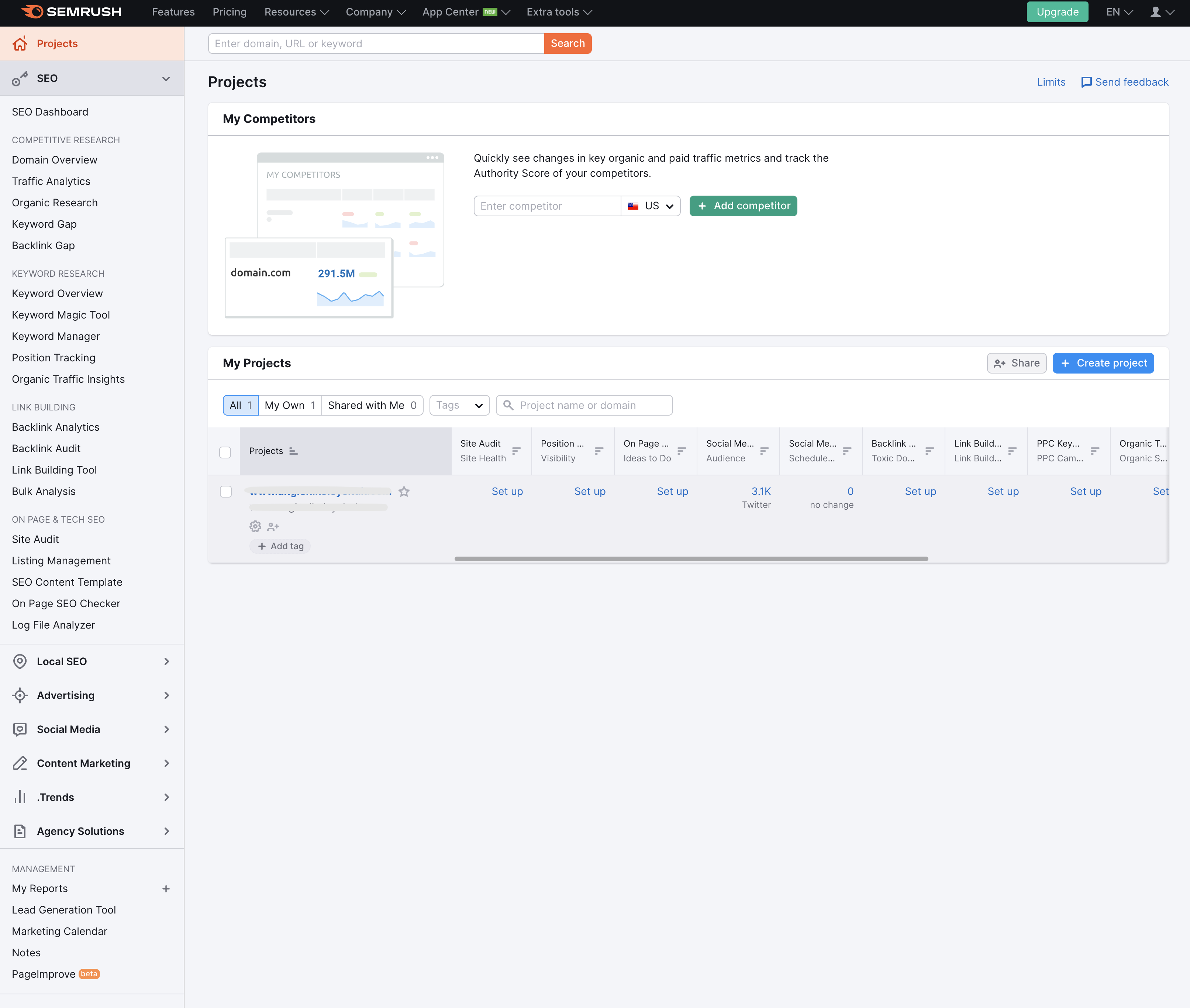 Screenshot from Semrush
Screenshot from SemrushCost: $119.95 to $449.95 per month.
In its digital marketing suite, Semrush offers a collection of six keyword tools and four competitive analysis tools with a database of more than 21 billion keywords.
You can get a full overview of the keywords you’re watching, including paid and organic search volume, intent, competition, CPC, historical data, SERP analysis, and more.
You’ll get related keywords and questions, as well as a ton of guidance, ideas, and suggestions from the Semrush Magic, Position Tracking, and Organic Traffic Insights tools.
The Keyword Planner, however, is where much of the magic happens.
The organic competitor tab makes it easy to spot content and keyword gaps. Expand them and develop clusters that will help you grab traffic and conversions.
You can also see long-tail keyword data and other data to see what Page 1 holds regarding competition, difficulty, and opportunities at a broad or hyperlocal level.
The full suite of tools is a huge benefit. Teams can collaborate, share insights, and plan.
The seamless integration allows you to integrate your data, meaning teams can easily collaborate, share insights, and strategize.
And when you’re done, it can track everything you need for a successful digital marketing strategy.
Some of the tools they offer include:
- On-page SEO tools.
- Competitive analysis suite.
- Log file analysis.
- Site auditing.
- Content marketing tools.
- Marketing analysis.
- Paid advertising tools.
- Local SEO tools.
- Rank tracking.
- Social media management.
- Link-building tools.
- Amazon marketing tools.
- Website monetization tools.
Semrush’s best features when it comes to keyword research are its historical information and PPC metrics.
You can deep dive into campaigns and keywords to unlock the secrets of the SERPs and provide agency or in-house teams with priceless information they don’t usually access.
4. Moz Keyword Explorer
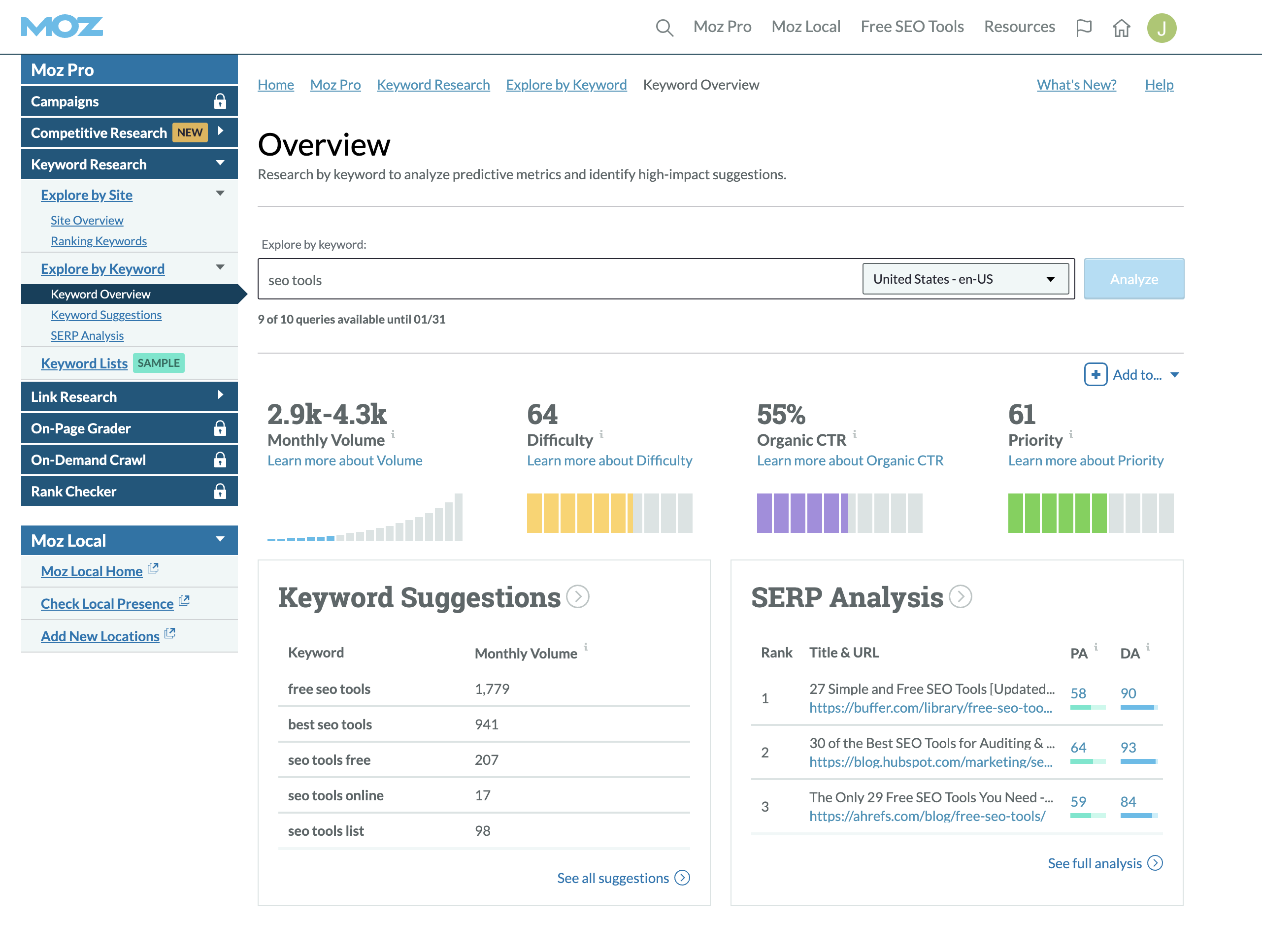 Screenshot from Moz, January 2023
Screenshot from Moz, January 2023Cost: Free for 10 queries per month. $99-$599 per month.
With a database of more than 500 million keywords, Moz Keyword Explorer may be a great option if you’re looking to build a strategy rather than get a quick view of the data for a few keywords.
Moz has long been a leader in the SEO space.
Constantly updating and improving its Keyword Explorer Tool and its other core services, Moz keeps up with the trends and is well known for providing SEO professionals with the latest tools. And it has done so for more than a decade.
Like the Google Keyword Tool, Moz’s keyword planning tool provides information on the difficulty and monthly search volume for terms. It also lets you drill down geographically.
When you start, you’ll find the Keyword Overview, which provides monthly search volumes, ranking difficulty, organic click-through opportunities, and an estimated priority level.
You can also:
- Find new relevant keywords you should be targeting but aren’t.
- Learn how your site performs for keywords.
- Find areas where you can improve your SEO (including quick wins and larger investments).
- Prioritize keywords for efficient strategy creation.
- Top SERP analysis and features.
- Competitor analysis.
- Organic click-through rates.
Unlike the Google Keyword Tool, however, Moz supplies you with data beyond the basics. Think of it like keyword research and SERP analysis.
Moz does tend to have fewer keyword suggestions. And like Google’s Keyword Planner, it provides range estimates for search data rather than a specific number.
However, the database is updated frequently, so you can feel confident that you’re keeping up with the constant change in consumer search habits and rankings.
Plus, it’s easy to use, so teams can quickly take care of marketing tasks like finding opportunities, tracking performance, identifying problem areas, and gathering page-level details.
Moz also offers several other tools to help you get your site on track and ahead of the competition, but we really like it for its keyword research and flexibility.
5. Ahrefs Keyword Explorer
Cost: $99-$999 per month.
If I had to describe Ahrefs in one word, it would be power.
Enter a word into the search box, and you’re presented with multiple panels that can tell you everything you want to know about that keyword.
Total search volume, clicks, difficulty, the SERP features, and even a volume-difficulty distribution. And while it may look like a lot, all the information is well-organized and clearly presented.
Ahrefs provides terms in a parent-child topic format, providing the terms with context, so you can easily learn more about the terms, such as intent, while identifying overlap and keeping it all easy to find and understand.
These topics appear when you search for a related term, including the term’s ranking on the SERP, SERP result type, first-page ranking difficulty scores, and a snapshot of the user-delivered SERP. You can stay broad or narrow it all down by city or language.
Ahrefs can get a bit expensive. Agencies may find it difficult to scale if they prefer several user or client accounts, but it’s still one of the best and most reliable keyword research tools on the market.
What I really like about Ahrefs is that it’s thorough. It has one of the largest databases of all the tools available (19.2 billion keywords, 10 search engines, and 242 countries at the time of writing), and it’s regularly updated.
It makes international SEO strategies a breeze and includes data for everything from Google and Bing to YouTube and Amazon.
Plus, they clearly explain their metrics and database. And that level of transparency means trust.
Other tools in the suite include:
- Site Explorer.
- Site auditing.
- Rank tracking.
- Content Explorer.
6. SERanking
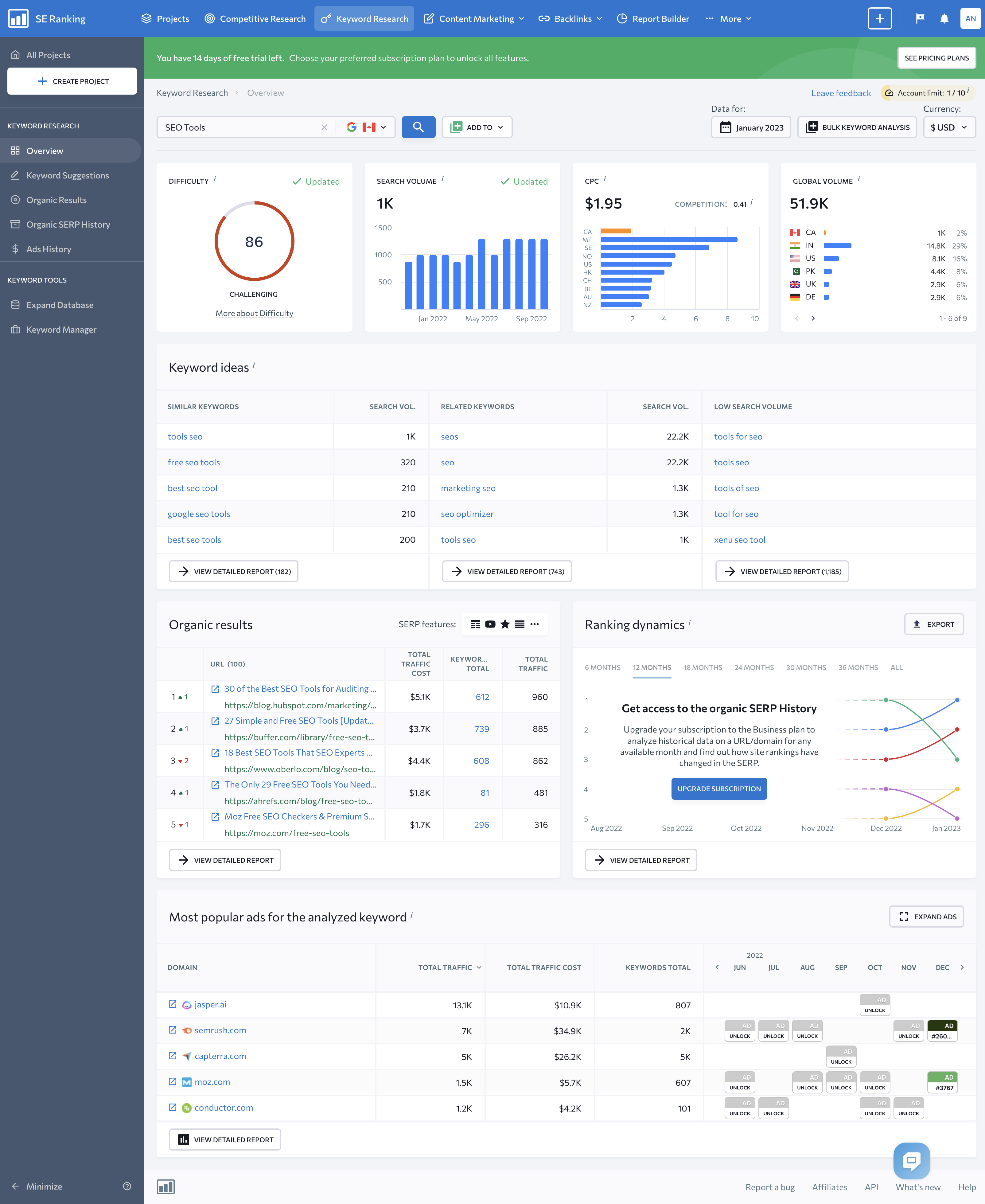 Screenshot from SERanking, November 2022.
Screenshot from SERanking, November 2022.Cost: $23.52-$239 per month, depending on the ranking check and payment frequency.
SERanking shines as a keyword research tool within an all-around SEO toolkit. SERanking helps you keep costs down while offering features that allow agencies to meet clients’ unique needs.
One of the first things you’ll notice when you log in is its intuitive user interface. But this tool isn’t just another pretty online tool.
Its database is robust.
SERanking’s U.S. database includes 887 million keywords, 327 million U.S. domains, and 3 trillion indexed backlinks. And this doesn’t include its expansive European and Asian databases.
The overview page provides a solid look at the data, which includes search volume, the CPC, and a difficulty score.
SERanking also provides lists of related and low-volume keywords if you need inspiration or suggestions, as well as long-tail keyword suggestions with information about SERP features, competition levels, search volume, and other details you need to know to identify new opportunities.
Of course, identifying keywords is only the start of the mystery. How do you turn keywords into conversions? SERanking provides keyword tools that help you answer this question.
You can find out who the competition is in the organic results and see who is buying search ads, as well as details like estimated traffic levels and copies of the ads they’re using.
This allows you to see what’s working, gain insights into the users searching for those terms, and generate new ideas to try.
SERanking offers agency features, such as white labeling, report builders, lead generator, and other features you’ll find helpful.
However, one of the features agencies might find most helpful in keyword research is SERanking’s bulk keyword analysis, which lets you run thousands of keywords and download full reports for all the terms that matter.
Other tools in the SERanking Suite include:
- Keyword Rank Tracker.
- Keyword Grouper.
- Keyword Suggestions and Search Volume Checker.
- Index Status checker.
- Backlink Checker.
- Backlink monitoring.
- Competitive research tool.
- Website auditing tool.
- On-page SEO Checker.
- Page Changes Monitor.
- Social media analytics.
- Traffic analysis.
SERanking is more affordable than some of the other tools out there, but it does come at a cost.
It isn’t as robust as some of its competitors and doesn’t get as granular in the same way, but it still provides the features and data you need to create a successful SEO strategy.
And with its flexible pricing, this tool is well worth considering.
7. BrightEdge Data Cube
Cost: Custom pricing model.
If you’re looking for an AI-powered digital marketing tool suite that includes a quality research tool, BrightEdge may be the right option for you.
Unlike other tools that focus on supplying you with data and ways to analyze that data, BrightEdge looks to do much of the time-consuming analysis for you.
Among its search, content, social, local, and mobile solutions, you’ll find Data Cube – an AI-backed content and keyword tool that uses natural language processing to find related topics and keywords.
You’ll also encounter DataMind, an AI that helps you find search trends, changes in consumer behaviors, and important competitor movements you need to know about.
The two together make it quick and easy to perform keyword research, build out topics, create content strategies, and strengthen your SEO plans.
Once you enter a topic or broad keyword, the tool will provide you with relevant keywords, the search volume, competition levels, keyword value, it’s universal listing, and the number of words in the phrase.
Filter the results by a custom set of criteria to narrow the list down and get the necessary information.
Once you have a list, select the ones you want to keep and download them or use them with BrightEdge’s other tools to create full strategies and gain more insights.
This could include competitor analysis, analyzing SERP features, intent, or other tasks.
For agencies that provide local SEO, BrightEdge also offers HyperLocal, which helps you find and track keywords and keyword performance at the local level.
When you’re done, give the Opportunity Forecasting and tracking tools a try to monitor your progress and provide clients with the information they care about.
Perhaps the nicest feature for agencies is its Storybuilder – a reporting tool that allows you to create rich client reports that provide clients with targeted overviews and the data they’re most interested in.
If this sounds like the right tool for you, the company gives demos, but there are a few things you should consider.
First, it only updates once per month. And while the company keeps its pricing close to the chest, this digital marketing tool suite is a significant investment. It may not be the best choice if keyword research is the only thing you need.
Secondly, while the tools are highly sophisticated and refined, there is a learning curve to get started.
You’ll also discover that there are limits on features like keyword tracking, and it can be time-consuming to set up, with some adjustments requiring technical support.
Lastly, BrightEdge’s keyword research tool doesn’t let you get too far into the weeds and doesn’t include PPC traffic.
That aside, agencies and larger brands will find that it scales easily, has a beautifully designed UI, and makes you look great to clients.
The Best Agency SEO Keyword Research Tools
This list only contains seven of the many tools available today to help you get your keyword research done to an expert degree.
But no matter how many of the tools we share with you or which ones, it’s important to understand that none are flawless.
Each tool has its own unique strengths and weaknesses, so selecting a platform is very much dependent on the types of clients that you typically work with and personal preference.
In reality, you’ll likely find that you prefer to work between a few tools to accomplish everything you’d like.
Google Keyword Planner and Keyword.io are top choices when you want a quick look at the data, or you’d like to export the data to work on elsewhere. You may even want to use this data with the other tools mentioned in this chapter.
Ahrefs, Moz, Semrush, and BrightEdge are far more robust and are better suited to agency SEO tasks.
While not free (although they offer free plans or a trial period except BrightEdge), they allow you to really dig into the search space, ultimately resulting in higher traffic, more conversions, and stronger SEO strategies. These benefits require more time and often come with a learning curve.
By far, the most important keyword research tool you have access to is you.
Keyword research is more than simply choosing the keywords with the biggest search volume or the phrase with the lowest Cost Per Click (CPC).
It’s your expertise, experience, knowledge, and insights that transform data into digital marketing you can be proud of.
Featured Image: Paulo Bobita/Search Engine Journal
SEO
brightonSEO Live Blog

Hello everyone. It’s April again, so I’m back in Brighton for another two days of Being the introvert I am, my idea of fun isn’t hanging around our booth all day explaining we’ve run out of t-shirts (seriously, you need to be fast if you want swag!). So I decided to do something useful and live-blog the event instead.
Follow below for talk takeaways and (very) mildly humorous commentary. sun, sea, and SEO!
SEO
Google Further Postpones Third-Party Cookie Deprecation In Chrome

Google has again delayed its plan to phase out third-party cookies in the Chrome web browser. The latest postponement comes after ongoing challenges in reconciling feedback from industry stakeholders and regulators.
The announcement was made in Google and the UK’s Competition and Markets Authority (CMA) joint quarterly report on the Privacy Sandbox initiative, scheduled for release on April 26.
Chrome’s Third-Party Cookie Phaseout Pushed To 2025
Google states it “will not complete third-party cookie deprecation during the second half of Q4” this year as planned.
Instead, the tech giant aims to begin deprecating third-party cookies in Chrome “starting early next year,” assuming an agreement can be reached with the CMA and the UK’s Information Commissioner’s Office (ICO).
The statement reads:
“We recognize that there are ongoing challenges related to reconciling divergent feedback from the industry, regulators and developers, and will continue to engage closely with the entire ecosystem. It’s also critical that the CMA has sufficient time to review all evidence, including results from industry tests, which the CMA has asked market participants to provide by the end of June.”
Continued Engagement With Regulators
Google reiterated its commitment to “engaging closely with the CMA and ICO” throughout the process and hopes to conclude discussions this year.
This marks the third delay to Google’s plan to deprecate third-party cookies, initially aiming for a Q3 2023 phaseout before pushing it back to late 2024.
The postponements reflect the challenges in transitioning away from cross-site user tracking while balancing privacy and advertiser interests.
Transition Period & Impact
In January, Chrome began restricting third-party cookie access for 1% of users globally. This percentage was expected to gradually increase until 100% of users were covered by Q3 2024.
However, the latest delay gives websites and services more time to migrate away from third-party cookie dependencies through Google’s limited “deprecation trials” program.
The trials offer temporary cookie access extensions until December 27, 2024, for non-advertising use cases that can demonstrate direct user impact and functional breakage.
While easing the transition, the trials have strict eligibility rules. Advertising-related services are ineligible, and origins matching known ad-related domains are rejected.
Google states the program aims to address functional issues rather than relieve general data collection inconveniences.
Publisher & Advertiser Implications
The repeated delays highlight the potential disruption for digital publishers and advertisers relying on third-party cookie tracking.
Industry groups have raised concerns that restricting cross-site tracking could push websites toward more opaque privacy-invasive practices.
However, privacy advocates view the phaseout as crucial in preventing covert user profiling across the web.
With the latest postponement, all parties have more time to prepare for the eventual loss of third-party cookies and adopt Google’s proposed Privacy Sandbox APIs as replacements.
Featured Image: Novikov Aleksey/Shutterstock
SEO
How To Write ChatGPT Prompts To Get The Best Results

ChatGPT is a game changer in the field of SEO. This powerful language model can generate human-like content, making it an invaluable tool for SEO professionals.
However, the prompts you provide largely determine the quality of the output.
To unlock the full potential of ChatGPT and create content that resonates with your audience and search engines, writing effective prompts is crucial.
In this comprehensive guide, we’ll explore the art of writing prompts for ChatGPT, covering everything from basic techniques to advanced strategies for layering prompts and generating high-quality, SEO-friendly content.
Writing Prompts For ChatGPT
What Is A ChatGPT Prompt?
A ChatGPT prompt is an instruction or discussion topic a user provides for the ChatGPT AI model to respond to.
The prompt can be a question, statement, or any other stimulus to spark creativity, reflection, or engagement.
Users can use the prompt to generate ideas, share their thoughts, or start a conversation.
ChatGPT prompts are designed to be open-ended and can be customized based on the user’s preferences and interests.
How To Write Prompts For ChatGPT
Start by giving ChatGPT a writing prompt, such as, “Write a short story about a person who discovers they have a superpower.”
ChatGPT will then generate a response based on your prompt. Depending on the prompt’s complexity and the level of detail you requested, the answer may be a few sentences or several paragraphs long.
Use the ChatGPT-generated response as a starting point for your writing. You can take the ideas and concepts presented in the answer and expand upon them, adding your own unique spin to the story.
If you want to generate additional ideas, try asking ChatGPT follow-up questions related to your original prompt.
For example, you could ask, “What challenges might the person face in exploring their newfound superpower?” Or, “How might the person’s relationships with others be affected by their superpower?”
Remember that ChatGPT’s answers are generated by artificial intelligence and may not always be perfect or exactly what you want.
However, they can still be a great source of inspiration and help you start writing.
Must-Have GPTs Assistant
I recommend installing the WebBrowser Assistant created by the OpenAI Team. This tool allows you to add relevant Bing results to your ChatGPT prompts.
This assistant adds the first web results to your ChatGPT prompts for more accurate and up-to-date conversations.
It is very easy to install in only two clicks. (Click on Start Chat.)
For example, if I ask, “Who is Vincent Terrasi?,” ChatGPT has no answer.
With WebBrower Assistant, the assistant creates a new prompt with the first Bing results, and now ChatGPT knows who Vincent Terrasi is.
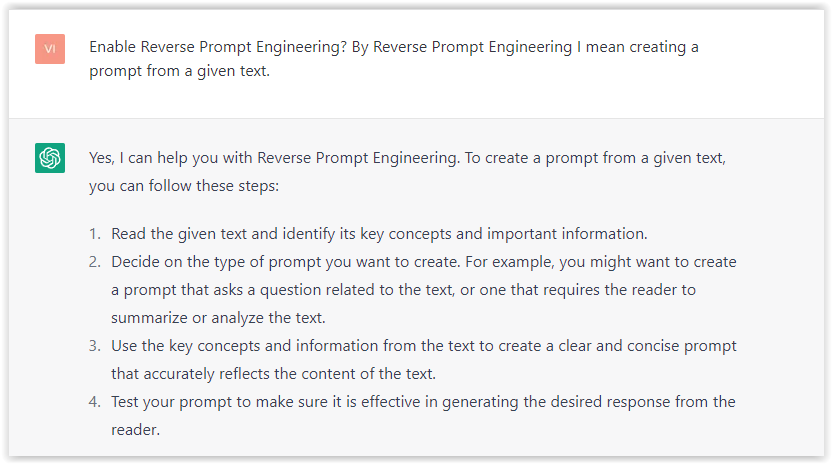 Screenshot from ChatGPT, March 2023
Screenshot from ChatGPT, March 2023You can test other GPT assistants available in the GPTs search engine if you want to use Google results.
Master Reverse Prompt Engineering
ChatGPT can be an excellent tool for reverse engineering prompts because it generates natural and engaging responses to any given input.
By analyzing the prompts generated by ChatGPT, it is possible to gain insight into the model’s underlying thought processes and decision-making strategies.
One key benefit of using ChatGPT to reverse engineer prompts is that the model is highly transparent in its decision-making.
This means that the reasoning and logic behind each response can be traced, making it easier to understand how the model arrives at its conclusions.
Once you’ve done this a few times for different types of content, you’ll gain insight into crafting more effective prompts.
Prepare Your ChatGPT For Generating Prompts
First, activate the reverse prompt engineering.
- Type the following prompt: “Enable Reverse Prompt Engineering? By Reverse Prompt Engineering I mean creating a prompt from a given text.”
 Screenshot from ChatGPT, March 2023
Screenshot from ChatGPT, March 2023ChatGPT is now ready to generate your prompt. You can test the product description in a new chatbot session and evaluate the generated prompt.
- Type: “Create a very technical reverse prompt engineering template for a product description about iPhone 11.”
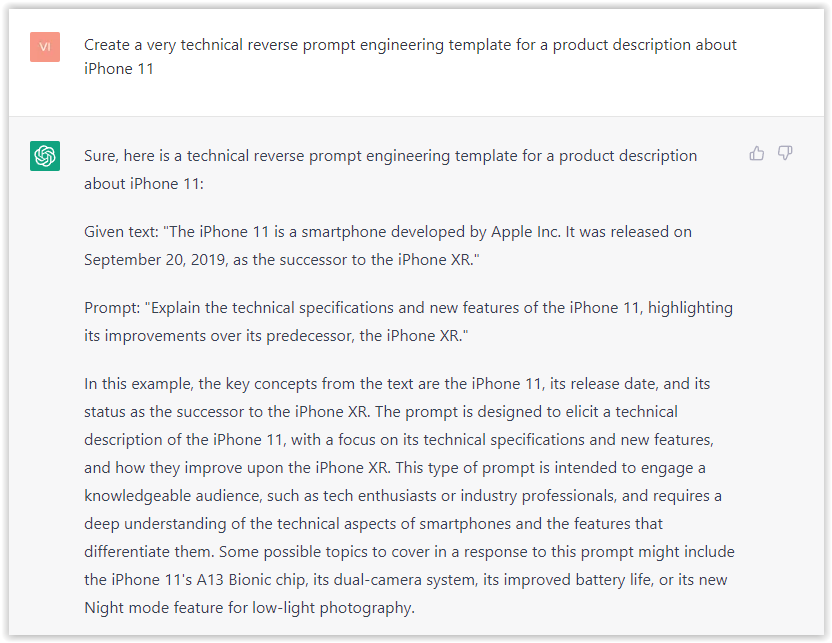 Screenshot from ChatGPT, March 2023
Screenshot from ChatGPT, March 2023The result is amazing. You can test with a full text that you want to reproduce. Here is an example of a prompt for selling a Kindle on Amazon.
- Type: “Reverse Prompt engineer the following {product), capture the writing style and the length of the text :
product =”
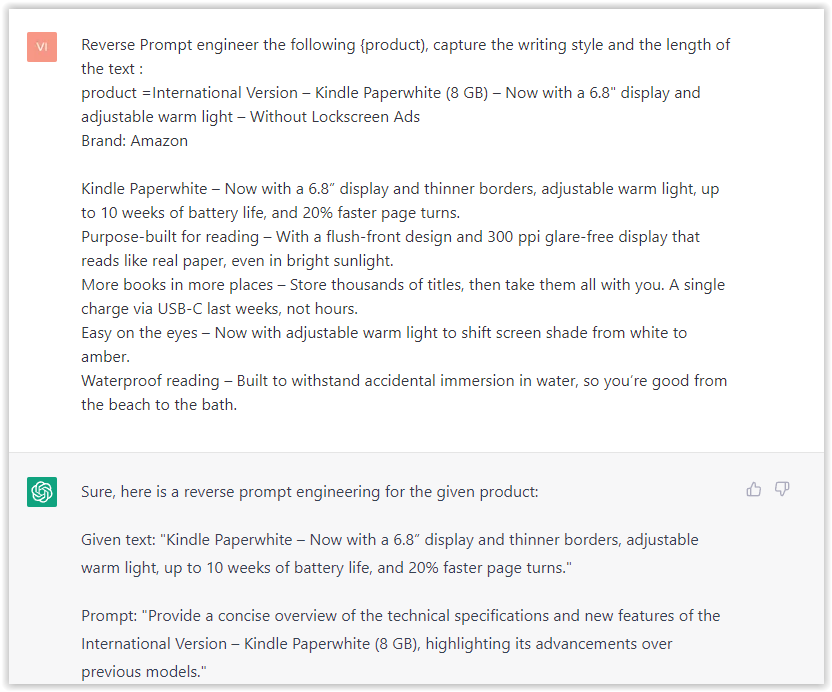 Screenshot from ChatGPT, March 2023
Screenshot from ChatGPT, March 2023I tested it on an SEJ blog post. Enjoy the analysis – it is excellent.
- Type: “Reverse Prompt engineer the following {text}, capture the tone and writing style of the {text} to include in the prompt :
text = all text coming from https://www.searchenginejournal.com/google-bard-training-data/478941/”
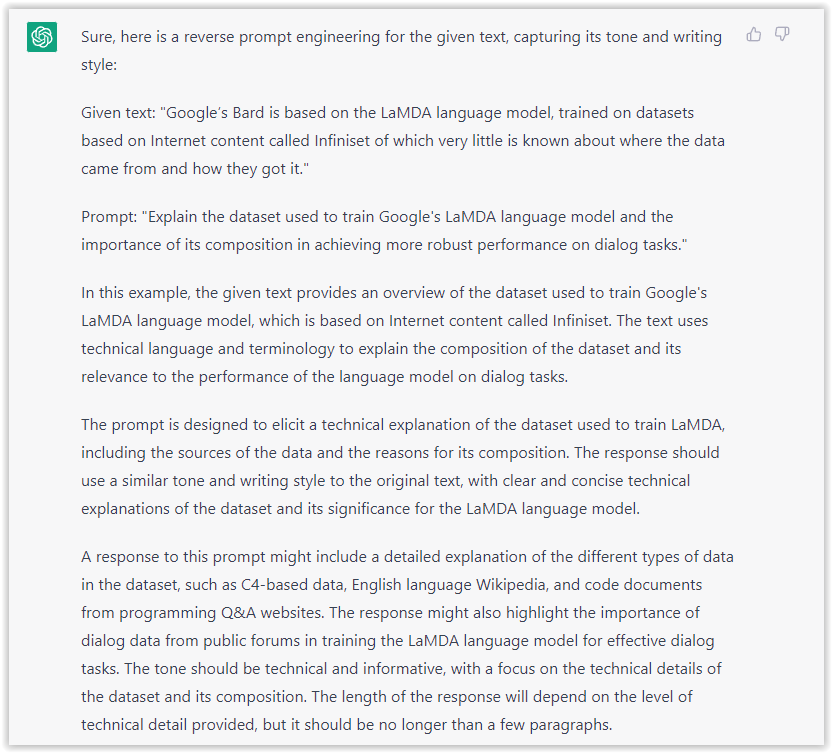 Screenshot from ChatGPT, March 2023
Screenshot from ChatGPT, March 2023But be careful not to use ChatGPT to generate your texts. It is just a personal assistant.
Go Deeper
Prompts and examples for SEO:
- Keyword research and content ideas prompt: “Provide a list of 20 long-tail keyword ideas related to ‘local SEO strategies’ along with brief content topic descriptions for each keyword.”
- Optimizing content for featured snippets prompt: “Write a 40-50 word paragraph optimized for the query ‘what is the featured snippet in Google search’ that could potentially earn the featured snippet.”
- Creating meta descriptions prompt: “Draft a compelling meta description for the following blog post title: ’10 Technical SEO Factors You Can’t Ignore in 2024′.”
Important Considerations:
- Always Fact-Check: While ChatGPT can be a helpful tool, it’s crucial to remember that it may generate inaccurate or fabricated information. Always verify any facts, statistics, or quotes generated by ChatGPT before incorporating them into your content.
- Maintain Control and Creativity: Use ChatGPT as a tool to assist your writing, not replace it. Don’t rely on it to do your thinking or create content from scratch. Your unique perspective and creativity are essential for producing high-quality, engaging content.
- Iteration is Key: Refine and revise the outputs generated by ChatGPT to ensure they align with your voice, style, and intended message.
Additional Prompts for Rewording and SEO:
– Rewrite this sentence to be more concise and impactful.
– Suggest alternative phrasing for this section to improve clarity.
– Identify opportunities to incorporate relevant internal and external links.
– Analyze the keyword density and suggest improvements for better SEO.
Remember, while ChatGPT can be a valuable tool, it’s essential to use it responsibly and maintain control over your content creation process.
Experiment And Refine Your Prompting Techniques
Writing effective prompts for ChatGPT is an essential skill for any SEO professional who wants to harness the power of AI-generated content.
Hopefully, the insights and examples shared in this article can inspire you and help guide you to crafting stronger prompts that yield high-quality content.
Remember to experiment with layering prompts, iterating on the output, and continually refining your prompting techniques.
This will help you stay ahead of the curve in the ever-changing world of SEO.
More resources:
Featured Image: Tapati Rinchumrus/Shutterstock
-

 PPC6 days ago
PPC6 days ago19 Best SEO Tools in 2024 (For Every Use Case)
-

 MARKETING7 days ago
MARKETING7 days agoEcommerce evolution: Blurring the lines between B2B and B2C
-
SEARCHENGINES5 days ago
Daily Search Forum Recap: April 19, 2024
-
SEARCHENGINES6 days ago
Daily Search Forum Recap: April 18, 2024
-

 WORDPRESS6 days ago
WORDPRESS6 days agoHow to Make $5000 of Passive Income Every Month in WordPress
-

 SEO7 days ago
SEO7 days ago2024 WordPress Vulnerability Report Shows Errors Sites Keep Making
-

 WORDPRESS7 days ago
WORDPRESS7 days ago10 Amazing WordPress Design Resouces – WordPress.com News
-

 SEO6 days ago
SEO6 days ago25 WordPress Alternatives Best For SEO
















You must be logged in to post a comment Login